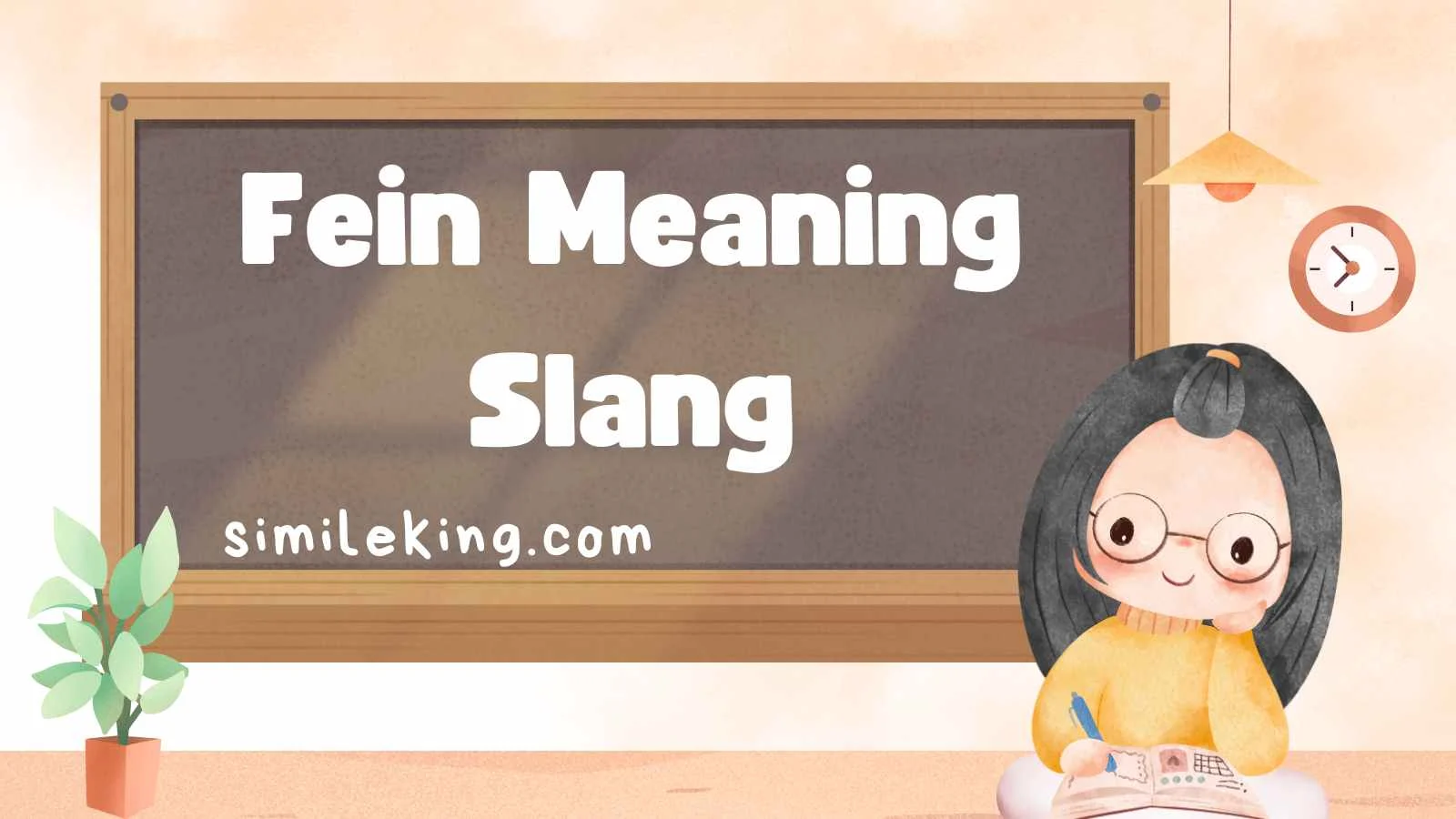Language is alive. Words shift, phrases morph, and slang slips into everyday conversations faster than dictionaries can keep up. Among those terms, “fein” is one that has sparked curiosity across texting culture, music lyrics, and casual speech. If you’ve stumbled upon this word in 2025 and wondered, “What does ‘fein’ mean in slang?”, you’re not alone.
This guide explores the meaning of “fein,” its origins, modern-day usage, and the subtle differences in tone depending on context. We’ll also dive into alternatives you can use—whether you want to sound casual, professional, or polite. And to make things practical, you’ll find 10 strong examples of how “fein” appears in conversation today.
By the end, you’ll not only understand “fein” but also know how to choose the right word in any setting.
What Does “Fein” Mean in Slang?
In slang, “fein” (sometimes spelled fiend) refers to a person who craves something intensely, almost obsessively. Originally linked to drug slang in street language, the term has broadened in use and meaning over time.
- At its rawest, “fein” means an addict—someone who’s hooked on drugs, particularly crack or heroin.
- In modern slang (especially in texting and casual talk), “fein” can mean anyone desperate for something—whether it’s attention, social media likes, a new sneaker drop, or even food.
👉 Example: “Bro’s a fein for likes—he can’t post without checking his phone every five seconds.”
Thus, the meaning has shifted: it’s no longer just about substance use. In 2025, “fein” is a flexible word to describe extreme craving, neediness, or obsession.
The Origins of “Fein” in Street Slang
The roots of “fein” trace back to African American Vernacular English (AAVE), where the original word was fiend. Over time, in speech and hip-hop culture, “fiend” softened into “fein.”
- 1980s–1990s: Used mainly to describe drug addicts.
- 2000s: Expanded into hip-hop to describe anyone hungry for success, money, or validation.
- 2020s–2025: Now common in texting, TikTok captions, and casual banter—referring to any exaggerated craving or desperation.
Like many slang terms, music and social media accelerated its spread. Today, you’ll see “fein” used in tweets, reels, or memes as casually as words like “stan” or “simp.”
The Nuance of Tone in “Fein”
One of the trickiest things about slang is tone. The word “fein” can feel playful, insulting, or even affectionate, depending on how you use it.
- Playful tone: Among friends, it’s teasing.
“You’re such a pizza fein—always ordering extra cheese.” - Insulting tone: Used harshly, it can mean someone is pathetic or desperate.
“Stop acting like a fein, bro—it’s not that serious.” - Affectionate tone: Sometimes used jokingly between close friends or couples.
“You’re a fein for my attention, huh?”
This flexibility makes it powerful but also risky—especially in professional settings where slang can come off as disrespectful or unpolished.
When Not to Use “Fein”
While slang helps people bond, “fein” isn’t always the best choice. In fact, in 2025, more professionals are aware of the need to separate casual slang from workplace communication.
Avoid using “fein” in:
- Emails or formal business contexts.
- Conversations with elders who may take offense at its addictive connotations.
- Academic writing where precision is required.
Instead, you can use alternatives that carry the same idea without the baggage.
Polite Alternatives to “Fein”
If you want to express craving, obsession, or neediness without sounding slang-heavy, here are polished alternatives:
- Eager – neutral and professional.
“She’s eager to learn more about the project.” - Enthusiastic – positive and uplifting.
“He’s enthusiastic about trying the new menu.” - Craving – casual but polite.
“I’m craving sushi tonight.” - Addicted (to) – figurative but more acceptable.
“She’s addicted to coffee.” - Obsessed – trendy but mainstream.
“He’s obsessed with fitness lately.” - Hungry for – common in motivational or workplace talk.
“They’re hungry for success.” - Yearning – poetic and formal.
“The artist was yearning for freedom of expression.” - Devoted – softer and less negative.
“She’s devoted to her craft.” - Passionate – polished and professional.
“He’s passionate about technology.” - Driven – formal, ideal for workplace.
“She’s driven to achieve her goals.”
Casual Alternatives to “Fein”
When texting friends or joking around, you don’t always want polite phrasing. Here are casual alternatives that keep the fun tone alive:
- Stan – fan-based obsession.
“I stan that artist so hard.” - Simp – excessive affection or obsession.
“He’s simping over her again.” - Thirsty – slang for desperation, often in dating.
“You’re looking real thirsty in those comments.” - Junkie – similar to fein but less harsh when playful.
“He’s a sneaker junkie.” - Addict – casual form.
“I’m a Netflix addict.” - Fiend (classic) – the original version.
“That guy’s a fiend for attention.” - Craver – rare but understandable.
“You’re a chocolate craver, admit it.” - Obsesso – playful exaggeration.
“She’s an obsesso with K-pop.” - Thirst monster – meme-worthy slang.
“Don’t be a thirst monster.” - Maniac – fun, exaggerated.
“He’s a maniac for spicy food.”
How to Choose the Right Word
Choosing between “fein” and its alternatives depends on context, relationship, and tone.
- With close friends: Use “fein” casually; it will land as a joke.
- With coworkers: Opt for “driven,” “eager,” or “enthusiastic.”
- In online communities: “Stan,” “simp,” or “thirsty” may resonate better.
- In romantic settings: Use softer alternatives like “addicted to you” or “obsessed with you.”
The golden rule in 2025: match your word choice to your audience.
10 Examples of “Fein” in Use (2025)
Here are ten practical examples showing how “fein” naturally appears in conversations today:
- “Stop refreshing the page—you’re fein for those concert tickets.”
- “Bro’s a fein for gaming; he hasn’t left the chair in hours.”
- “You’re fein for attention, always posting selfies.”
- “She’s a fein for iced coffee, even in winter.”
- “Don’t act like a fein, it’s just a text back.”
- “That kid’s a fein for TikTok trends.”
- “He’s fein for validation from strangers online.”
- “She’s fein for drama; she loves stirring the pot.”
- “You’re fein for dessert every single night.”
- “Bro’s fein for clout, always name-dropping.”
Notice how the tone ranges from playful teasing to light critique.
The Evolution of Slang in 2025
“Fein” is a great example of how slang evolves. In 2025, more slang terms are fluid, layered, and multi-toned—what starts as street language quickly becomes internet shorthand, reshaping how younger generations communicate.
In fact, linguists in 2025 note that slang is no longer just about rebellion—it’s about identity and speed. Words like “fein” spread not just because they’re edgy, but because they’re quick, relatable, and meme-worthy.
Final Thoughts
The slang term “fein” has traveled far from its harsh origins. Once used only to describe addicts, it now lives in memes, jokes, and texts as a word for anyone who craves too much of something.
Still, context matters. “Fein” is sharp, casual, and sometimes cutting. For professional or polite settings, alternatives like “eager,” “driven,” or “obsessed” may be better choices.
As slang keeps evolving in 2025, words like “fein” remind us that language is not static—it’s a mirror of culture, craving, and creativity.





